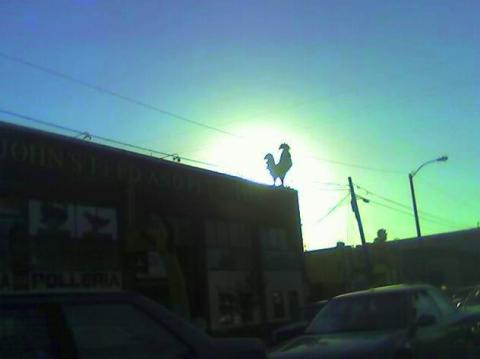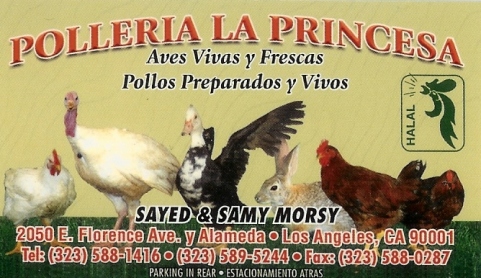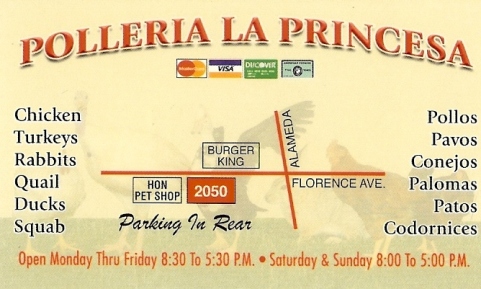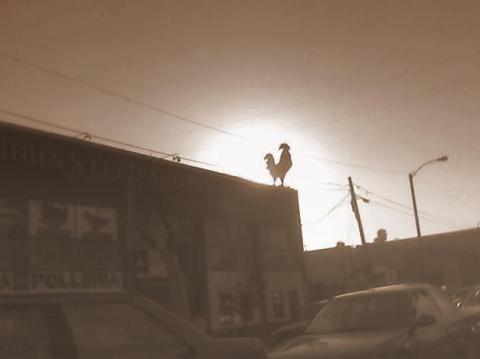
2050 E. Florence Ave. (@ Alameda) ~ Huntington Park, CA 90001 ~ (323) 588-1416 (TACO Map)
OK, I walked into this place, and it reeked. I mean, I’ve been to some markets in the third world, and you get a little of that. And this was an abattoir -- I wasn't expecting rainbows and flowers. But this was kind of breathe-through-your-mouth reek. But I wasn’t going to be in there that long, just long enough to look around and ask a few questions. I was thinking about seeing if I could get chicken hearts – just the hearts; maybe just a little bag of them to take home and cook on skewers like they have at churrascarias. I’m not big on all the giblets, but the roasted chicken hearts I had in the last year at Fogo de Chão and Green Fields in Long Beach were more than memorable. In the end, even though this place had the Health Inspector’s “A” hanging , let’s just say I “chickened out”. Still, I told myself, I might one day get up the gumption to buy these hearts or see how using pollo fresco improves my execution of the Zuni Roast Chicken recipe.
The next time I was in the neighborhood, I stopped into get a business card. This time, it smelled much better. Standing in line to talk to the cashier, I noticed a little wood plaque on the wall with some Arabic calligraphy on it. After the cashier finished with the customer in front of me, I asked her in Spanish if he knew the significance of the wood plaque. She told me that she never noticed it before, and came around the corner to look at it with me. I asked her, “¿Es el dueño árabe o … musulmán?” She told me that he was. I looked down and the business card and saw the crowing rooster logo with the word “HALAL” written next to it. Apparently, the animals that are butchered here meet their end in accordance with Muslim slaughtering practice. As far as my superficial research of this practice – called dhabiha – has informed me, this consists of (1) checking the health of the animal, (2) giving the animal water to drink, (3) pointing the animal towards Mecca, (4) saying a short prayer or invoking the name of God, (5) cutting the major arteries of the neck, the esophagus, and the trachea with one stroke of a serrated knife, and (6) allowing all of the blood to drain out of the animal.
One day, I will go back and buy and cook some pollo fresco…I just don’t know when. But I think it's a kind of moral obligation to truly consider the food we eat and where it comes from. Every one of us is probably seperated from the farm by only a few generations at most, but now we have fast food and would be hard pressed to tell from which part of a chicken the nugget comes from. But life only feeds upon life and, whether it be with the mouth or with the wallet, we consume a lot of suffering in this life. In a way, it is unavoidable. But we should be informed, aware, with our eyes wide open. Like Tony's Mercedes-Benz selling goomah tells him in Season 3, sometimes life requires us to seek "joyful participation in the suffering of the world." If I can acheive this by shopping sometime at Polleria La Princesa, the day I become a paying customer there might come sooner than you'd think.



Grace to Be Said at the Supermarket
This God of ours, the Great Geometer,
Does something for us here, where He hath put
(if you want to put it that way) things in shape,
Compressing the little lambs into orderly cubes,
Making the roast a decent cylinder,
Fairing the tin ellipsoid of a ham,
Getting the luncheon meat anonymous
In squares and oblongs with all the edges beveled
Or rounded (streamlined, maybe, for greater speed).
Praise Him, He hath conferred aesthetic distance
Upon our appetites, and on the bloody
Mess of our birthright, our unseemly need.
Imposed significant form. Through Him the brutes
Enter the pure Euclidean kingdom of number,
Free of their bulging and blood-swollen lives
They come to us holy, in cellophane
Transparencies, in the mystical body.
That we may look unflinchingly on death
As the greatest good, like a philosopher should.
-Howard Nemerov








